“Tennessee river and a mountain man, we get together anytime we can” goes the old song, and how much truth do these simple verses hold. On one side, the Volunteer State is the home of Nashville and Memphis, two music giants that helped shape music as we know it today. On the other side, you’ve got the Great Smoky Mountains, the Mississippi River, and a whopping 60,000 miles of rivers, lakes, streams, and creeks open for exploration. That’s why fishing in Tennessee holds a lot of promise for every passionate freshwater angler.

There are over 1,390 lakes and reservoirs to fish in the state, so it’s no wonder that Tennesseans take every chance to enjoy it all. If you’re into fly fishing, you’ve got Smokies in the east, veined through with clear mountain streams. Whatever famous freshwater fish you can think of, you’ll find it here. So let’s see the best of the best of what Tennessee has to offer, how you should fish, and where you should go.
What kind of fish can you catch in Tennessee?
There are over 300 species of freshwater fish you can hook into, but only some of them are all-time favorites. If you’re coming to Tennessee for the first time, here are the fish you don’t want to miss out on.
Striped Bass
There’s hardly a more popular freshwater game fish in Tennessee than Stripers. These feisty fellas give a great fight when hooked, and they get really big to boot. Along with Catfish, they’re probably the largest fish you can target in the state.
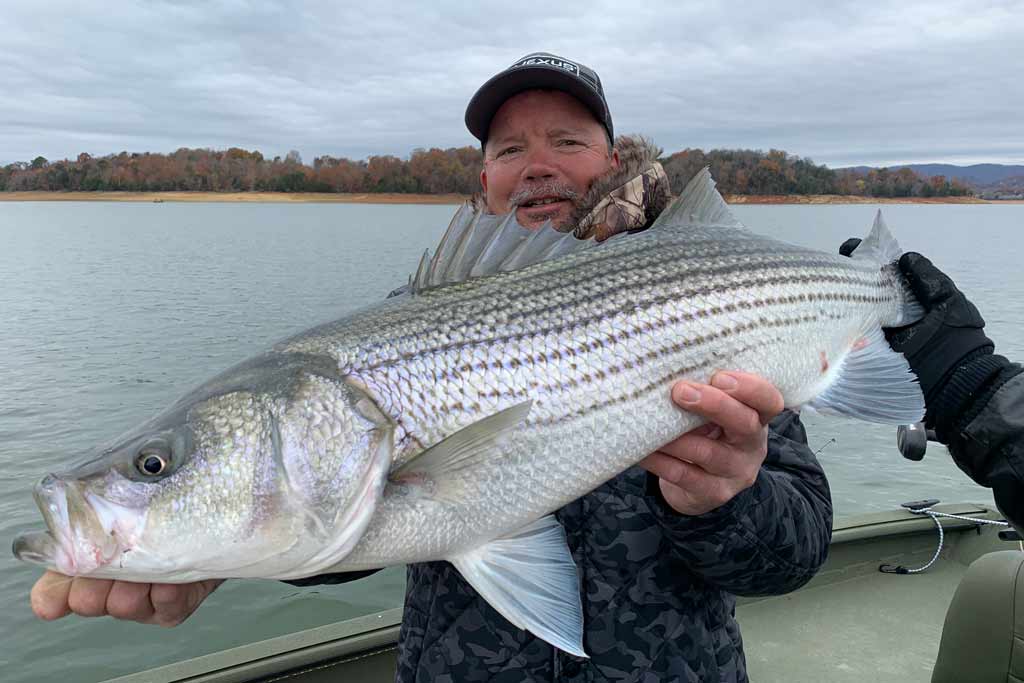
You can go after Striped Bass all year, but for the best action, spring and summer are your best bet. That’s when your prey stays cool in the deep waters, and where they’ll closely follow their favorite food – shad. You’ll find these bait fish wherever there’s structure at the bottom.
Shad will be crucial in getting Stripers to bite, both because you want to find the spots where they congregate and because you want to use them as your bait. Another option is to use skipjack herring. Live or cut bait works like a charm in attracting Striped Bass, but you can also go for artificial lures. When Bass feed close to the surface, you can try your luck with topwater plugs, crankbaits, and shiny spoons.
When it comes to technique, there’s a variety of options, but you’ll need a boat to get to the best spots. Trolling and drifting with planer boards are always a reliable choice, as well as vertical jigging when you’re going after Stripers close to the bottom. Once you get one on the line, put your weight into it, because Striped Bass will fight you every step of the way. But what a fight it’ll be!
Smallmouth Bass
If we tell you that the Smallmouth Bass is the official state fish of Tennessee, you can guess how good the bite is. If we add the fact that no less than three Smallmouth world records have been caught in the Dale Hollow Reservoir, you know the action is unmissable. It’s true, Smallie fishing in Tennessee is excellent year-round. Summer and the coldest days of winter boast top-notch fishing.
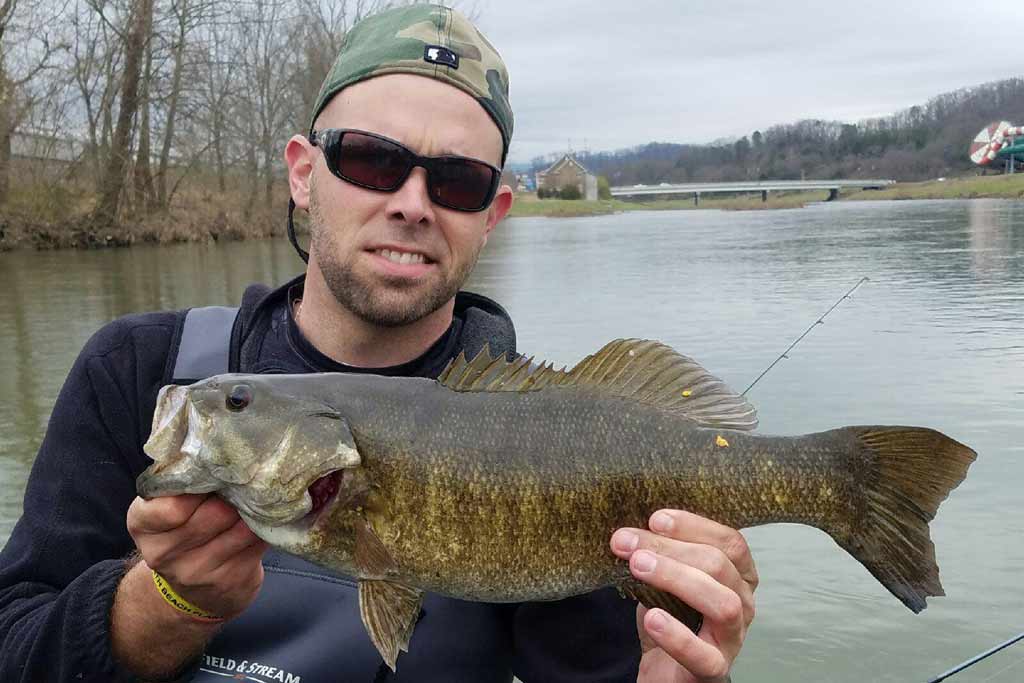
Smallmouth Bass aren’t big fish, but what they lack in size they make up for with their fighting prowess. While they mostly stay in the 1–5 lb range, there are some lunkers to be found here. Smallies prefer cooler, clear, running water, so streams are reliable fishing spots. If you’re fishing on a lake, focus on areas that are at least 15′ deep.
Smallies aren’t just powerful, they’re also intelligent, so they won’t mindlessly attack anything that moves. You need to present your offering well in order to get them on the line. Live bait and artificial lures work equally well. Smallmouth Bass live in schools around structure and rocks, which is where crawfish, their favorite food, live.
Using crawfish as live bait will be very productive. When it comes to artificials, crankbaits and jerk baits are the go-to option, but soft plastics won’t disappoint either. Fly fishing for Smallmouth Bass is fun and popular because of their acrobatics. Hellgrimites will work like a charm on the fly.
Largemouth Bass and Other Bass
Tennessee is a Bass fishing epicenter, so it’s no wonder that so many of them thrive here. There are plenty of lakes where you can hook into Largemouth Bass, and they can weigh anywhere from 2–8 pounds. Just like the other Bass we talked about, you can target Largies any day of the year, though you’ll have the best time doing it between May–September.

Unlike their Smallmouth cousins, Largemouths stick to calm warm waters. Since they’re ambush predators, they look for cover where they can wait for the unsuspecting prey. You can fish for them around feeder creeks, bays, docks, and in the backwaters. Lures are irresistible to these fish, especially jigs, soft plastics, and spinnerbaits. On the live bait side of things, you can use crayfish and nightcrawlers.
But Stripers, Largemouth, and Smallmouth Bass aren’t the only species you can find in the Volunteer State. White Bass, Spotted (Kentucky) Bass, and Hybrid (Cherokee) Bass are common in most big lakes. They usually take the same bait as the other Bass. If you’re a first-timer or you’re on the water with your family, these fellas are great targets and table fare.
Trout
Trout fishing in Tennessee is big! That’s hardly a surprise seeing that there are so many fast-flowing streams and rivers that provide the perfect Trout habitat. Whether you head to the Smokies or cast a line around river dams, you’re in for a treat. Rainbow, Brook, and Brown Trout are all on the menu, and the best time to chase them is in spring.
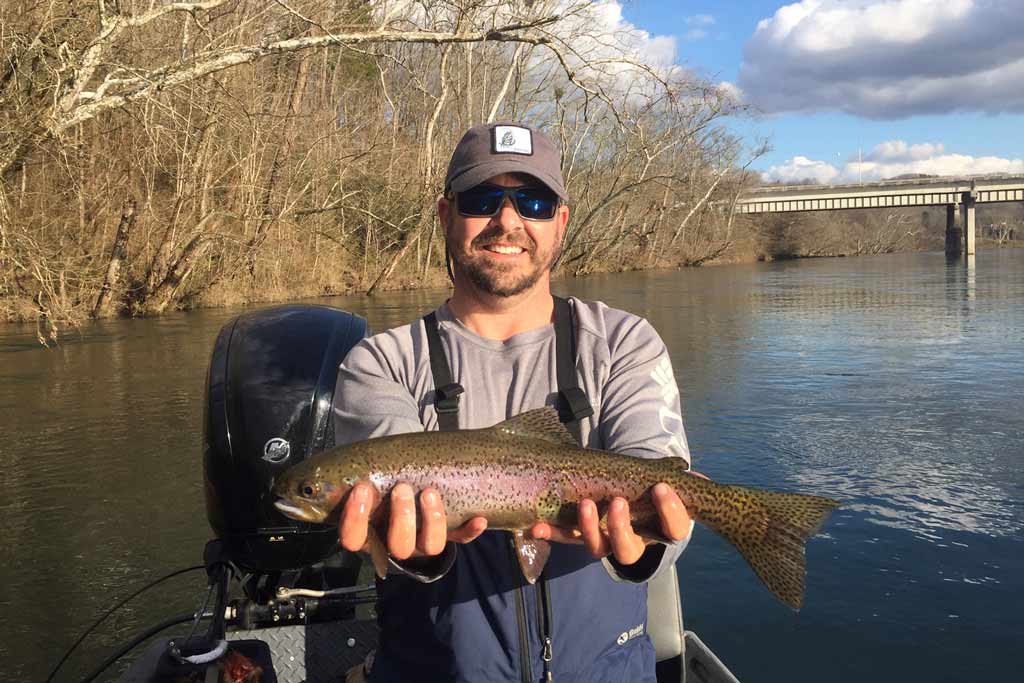
Trout love cold, clear running water, so the first thing you’ll need to do is find a watershed with a temperature around 65ºF. There’s plenty of Trout to go around, thanks to the stocking efforts of the Tennessee Wildlife Resources Agency in the past few decades.
Rainbows are the most popular choice of fly fishing enthusiasts. They love the mountain streams in Eastern Tennessee, so you’ll have a magnificent backdrop while you’re waiting for the bite. Not to mention that ‘Bows are absolutely beautiful and delicious.
Brook Trout follow close behind Rainbows, but what’s special about them is that they’re the only native Trout out of the bunch. Brown Trout are not as picky as Brookies and Rainbows, but they pack a punch when hooked. They’re regularly stocked in lakes all over the state, so it won’t be hard to find them.
There’s no better fish than Trout to go after on a fly. They’re largely responsible for fly fishing being one of Tennesseans’ favorite fishing techniques. Simply put, Trout are among the most beloved species in the state and it’s easy to see why.
Catfish
If there’s a fish that you can find virtually anywhere when fishing in Tennessee, it’s Catfish. These big ‘uns live in just about every watershed you set your sights on, and sometimes they’ll gobble down your bait faster than any other fish. Flathead, Channel, and Blue Catfish prowl the lakes in their everlasting search of food. You can catch them year-round.
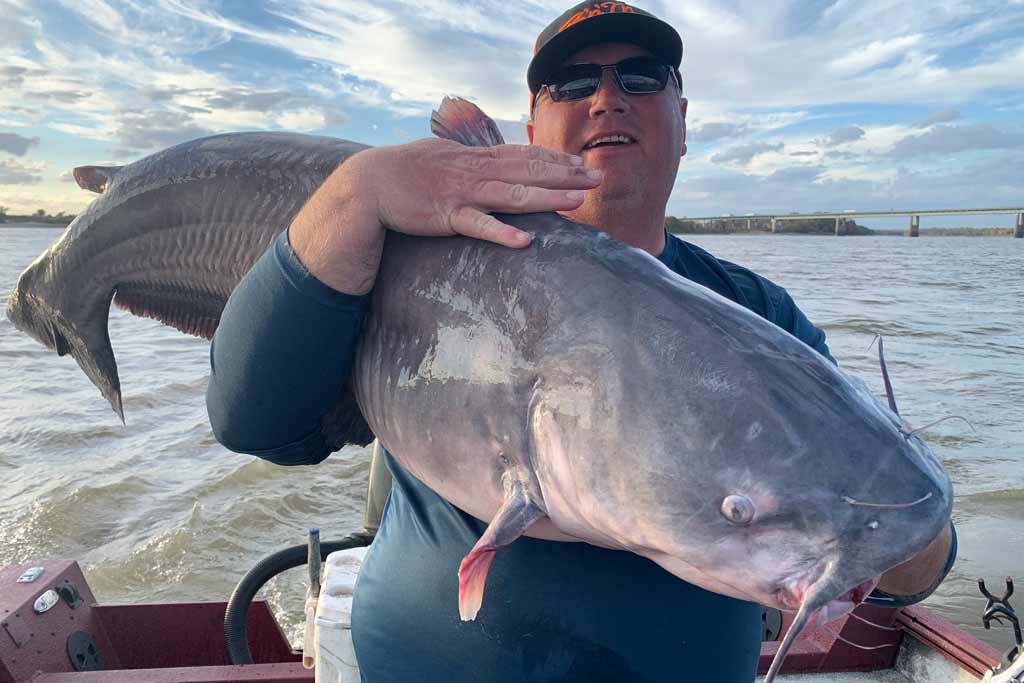
Unlike other game fish we mentioned, Cats can be quite lazy and they’re opportunistic feeders. As long as they spot something they can eat in their surroundings, they’ll make their move. Catfish respond well to a variety of live bait, including worms, panfish, and other bait fish.
Trophy chasers usually set their sights on Blue Catfish, because they’re the biggest of the three. They can grow to be over 100 pounds, with average catches being 50-pounders. They live in open reservoirs with a lot of structure.
Flatheads are smaller than Blues but very fun to reel in, especially around weeds and submerged rocks. Finally, Channel Catfish are the smallest ones in the group, but they make up for it with their deliciousness. They stay in the 5–10 lb ballpark, though you can score bigger ones in lakes.
Crappie, Musky, and More…
Since there are a few hundred different fish you can land in Tennessee, talking about all of them would require a book. However, along with Bass, Trout, and Catfish, there are some other freshwater species that deserve to be mentioned.
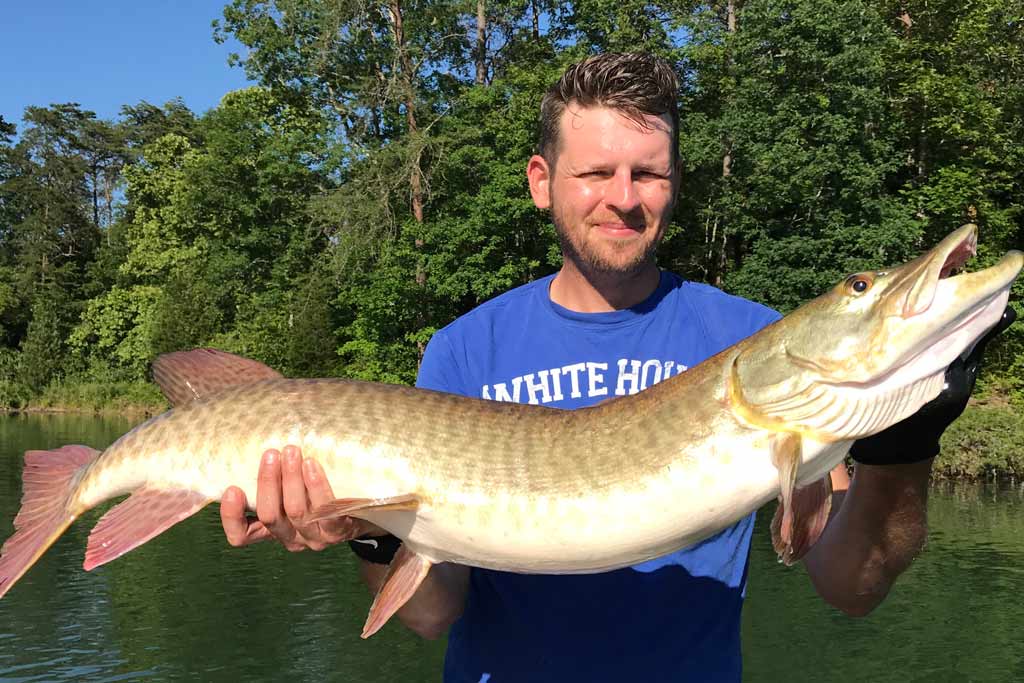
Crappie come to mind first, especially because they’re slowly becoming the “bread and butter” fish of the state. They’re abundant, they’ll give you a fight, and on top of it all, they’re super tasty. Crappie can weigh up to 5 pounds, and the best time to catch them is in March and April.
Muskellunge aka Musky are another must-catch if you’re looking for a memorable fight. You can also find Pickerel in lakes – both are ferocious and always hungry. Muskies love to eat and they’ve got teeth to prove it, so make sure you’ve got a strong leader before you start a row.
Carp, Gar, Walleye, and Sauger are on the menu as well, depending on where your Tenneessee fishing adventure takes you.
What kind of fishing is there in Tennessee?
There are two main ways to go fishing in Tennessee – from shore or from a boat. There are a few spots where you can go kayak fishing, but traditional light tackle and fly fishing are predominant.
Fishing with a Charter
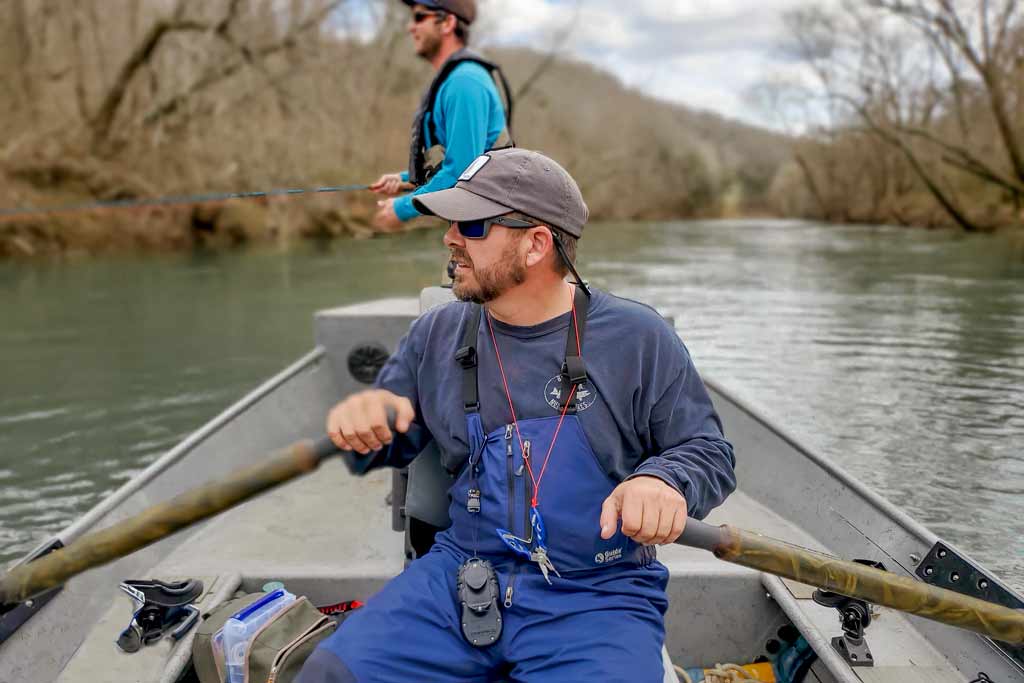
If you’re coming to fish in a state with thousands of lakes, choosing where to begin can get overwhelming quickly. That’s where an experienced fishing guide can be a lifesaver. Especially if you want to fish from a boat, hiring a professional to take you to the action is your safest bet.
Since the fishing in the Volunteer State is so good, you won’t have much trouble finding a charter captain. They live and work around the most productive fisheries and offer a variety of trips.
A simple 4-hour excursion can go a long way if you’re looking for a productive morning on the water. You’ve got trophy catches on your mind? Then booking a full day trip might be the best choice. The captain will let you know what to expect, how to prepare, and what kind of license you’ll need. All you need to do is show up and enjoy the experience.
Fly Fishing
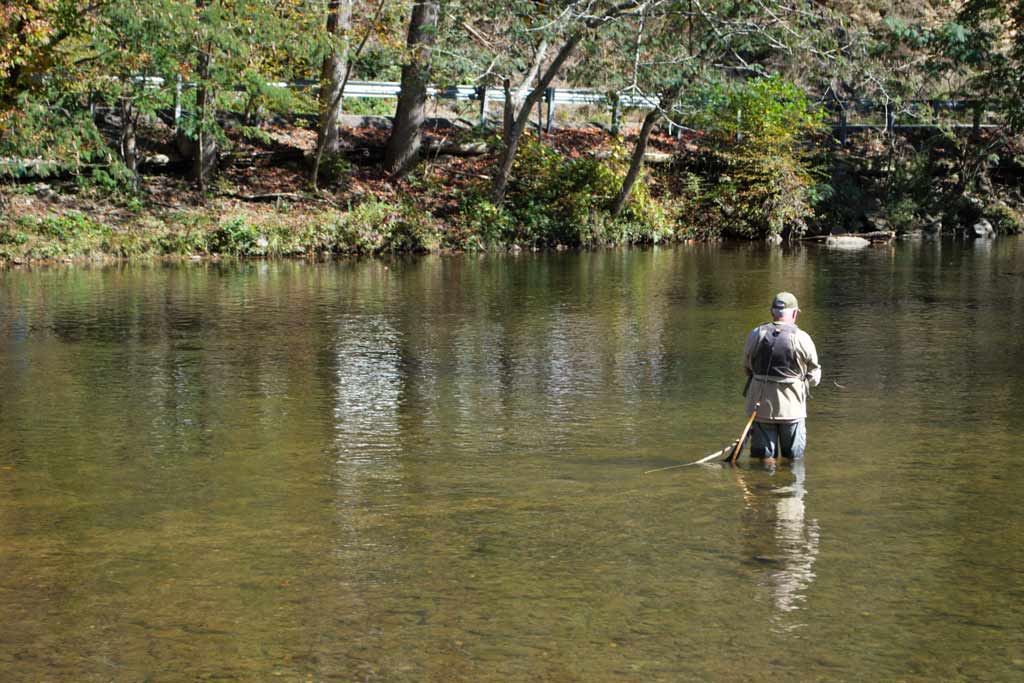
Many rivers and streams all over Tennessee helped turn fly fishing into a favored state-wide pastime. The combo of fish abundance, stunning nature, and all-around great fishing conditions is enough to lure you in.
The best place to start are the Great Smoky Mountains – these mountains hold some of the best fly fisheries in this part of the country. Wading is the way to go on these small streams and fast rivers where wild Trout thrive. You can also fly fish from drift boats on rivers that have deep sections further away from the bank.
If you’d like to battle something other than Trout, some fast-flowing creeks in East Tennessee hold good Smallmouth Bass. You’ll mostly be using streamers and dry flies, which work well because of the natural hatches of mayflies and midges that your prey can’t resist.
Where is the best fishing in Tennessee?
The short answer is, pretty much everywhere you go. For our choice of the very best fishing spots in Tennessee, check out the list below.

- Dale Hollow Reservoir: This is the place to be if you’re in love with Bass fishing. Not only was the world-record Smallmouth Bass caught here, but there’s also plenty of Largemouth Bass, Crappie, Spotted Bass, and Muskies.
- Old Hickory Lake: If you’re staying in Nashville and want a taste of first-class fishing, we recommend Old Hickory Lake. Whether you’re coming for a bit of catch and release, or you’re looking to find dinner, Bass, Catfish, and Crappie await.
- Chickamauga Lake: It might be a bit tricky to pronounce the lake’s name, but it won’t be difficult to find fish here, believe us. The biggest Largemouth Bass in the state was landed here, and there’s more where that came from. Catfish, Crappie, and Stripers are abundant too.
- Hiwassee River: This one is for all those Trout chasers out there. The Hiwassee is a premier fly fishing destination, with a lot of Browns and Rainbows to target. It’s also got beautiful surroundings, so you’ll be enjoying with all your senses.
- Hurricane Creek: Another fantastic Rainbow Trout fishery, Hurricane Creek is the poster child of the rich waters that Tennessee has to offer. You can have a duel with a big ‘Bow, or get yourself some Bass and Sunfish, it’s up to you.
Tennessee Fishing License & Regulations

Before you start fishing, you’ll need an appropriate fishing license. Anyone who’s over the age of 13 needs to have a valid fishing license, even if they’re just helping, and not fishing themselves.
There’s a variety of licenses that Tennessee residents can choose from, depending on how long you’d like to fish and whether or not you want to target Trout. Non-residents have fewer options, but still more than enough for all their fishing needs. You can get licenses online and in tackle stores. Your captain will keep you informed about how many fish you can keep and what their legal size should be.
Fishing in Freshwater Wonderland

From everything you’ve read, it’s not hard to see the allure of fishing in Tennessee. You get to hunt all the freshwater game fish you’d like in more watersheds than you can count. The whole state is like a fishermen’s playground, so all you have to do is pick where you want to begin.
Now, to you. Have you ever been fishing in Tennessee? Do you have a favorite catch or a spot? Is there something we missed? Share your stories in the comments below.
The post Tennessee Fishing: The Complete Guide appeared first on FishingBooker Blog.
https://ift.tt/KTcYzld
0 Comments
Enregistrer un commentaire